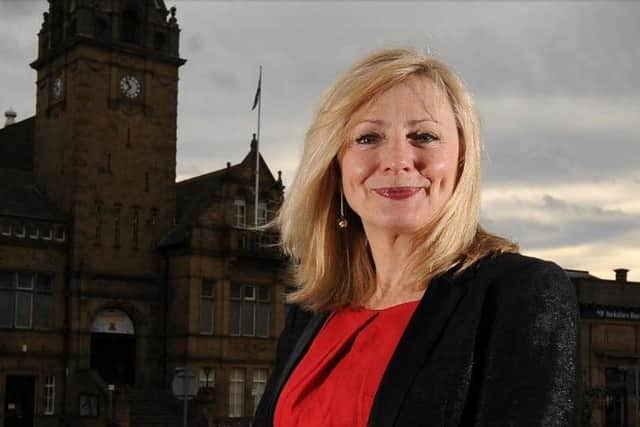'Yorkshire's film and TV sector must unite to recover from production shutdown'
As viewers across the nation turned to their own screens for comfort during weeks of isolation, huge numbers of projects behind such entertainment halted in late March - meaning a major loss of work for its freelance employment base.
But after new guidance on how camera crews can return to work this week signalled tentative steps of a resumption - Emmerdale has started filming six new episodes - figures from media, politics and tourism have told The Yorkshire Post of the sector’s importance to the region.


Advertisement
Hide AdAdvertisement
Hide AdCaroline Dinenage, Minister for Creative Industries, told The Yorkshire Post: “The creative industries are one of the UK’s greatest global calling cards and they will be right at the heart of our plans for the future as we look for innovative ways through recovery. Our dynamic screen sector will have a vital role to play, and I’m working closely with the industry to start cameras rolling safely again all across the country.
“The new guidance issued by broadcasters earlier this week will help Yorkshire’s growing production industry get back to making popular films and TV programmes like Emmerdale and Last Tango in Halifax.
“The government has provided an unprecedented package of financial support during these challenging times, including the Bounce Back Loans scheme and the self-employed income support scheme, which has been a safety net for many working in film and TV.”
But ex-Emmerdale and Coronation Street actress Tracy Brabin, now Batley and Spen MP and Shadow Minister for the Cultural Industries, wants the Government to have the same kind of vision for the creative industries that it has for sectors such as manufacturing and agriculture.
Advertisement
Hide AdAdvertisement
Hide Ad"It's absolutely vital for Yorkshire that we have a robust creative industry," she said.
"If the Government won't do it, or haven't the capacity or political will, then Yorkshire could show what we want to see by working together in a way we've seen over the last few years.
"We could be a cultural voice for Yorkshire."
The Equity trade union - which has set up its own £1m benevolent fund backed by Sir Mark Rylance - said at the outset of the crisis in the UK, that creative industries alone are worth £117bn to the economy
Screen Yorkshire, the regional agency for the industry, opened a new film office in November 2018, which in its first year handled more than 360 production enquiries, generating some 27 high-end TV shows and 14 feature films, with budgets averaging £10m and £20m per project.
Advertisement
Hide AdAdvertisement
Hide AdEarlier data from the Office of National Statistics (ONS) revealed that between 2009 and 2015, the region’s screen industries grew faster than anywhere else in the UK, including London and the South East.
Channel 4's choice to situate its new national headquarters in Leeds buoyed such cultural and economic prospects, but since the pandemic took hold the broadcaster warned starkly of its impact on finances, saying last month that its content budget for this year was expected to drop by £150m, in largely because of fallen advertising revenues.
Millions of pounds have been ringfenced, however, for shows produced in the 'nations and regions' outside London.
A spokesman previously stressed its commitment to moving into the Majestic building in Leeds, which was meant to happen this year, but said the pandemic had "impacted construction timetables and there may be some delay to our target date".
Advertisement
Hide AdAdvertisement
Hide AdAndrew Sheldon, creative director and founder of the True North factual television production company in Leeds, is realistic about the issues faced by traditional broadcasters but believes Yorkshire is well placed to recover compared to the capital.
He said: "It's come (the pandemic) at a time when the industry - both factual and scripted programmes - were on a little bit of a crest of a wave really.
"There has been a bit of a renaissance, in a way we haven't seen since Yorkshire Television was in full flight in the late 90s.
"So the timing of it has been unfortunate. Like every industry, there are substantial challenges for us going forward."
Advertisement
Hide AdAdvertisement
Hide AdSpeaking about Channel 4, he said: "There's no doubt at all this is an existential threat for them."
But he added: "Because historically we've had probably quite a low cost base out of London we're actually quite well placed in some respects to come out of this positively.
"If we can work together there's an incredible chance we can come out of this relatively soon.
Sally Joynson, chief executive of Screen Yorkshire, said: “If all the production that’s been put on hold starts up at the same time, that’s going to be a really busy period – but we’re still taking enquiries for productions looking at 2021.”
Advertisement
Hide AdAdvertisement
Hide AdIn terms of filmmaking, the UK's tax relief scheme has in recent years been an incentive for global producers to work in Britain.
After the Film Tax Relief was introduced in 2007, followed by similar schemes, the British Film Institute's most up-to-date report in 2018 showed that it seeded £3.16 billion in direct production spend in 2016, a 17 per cent increase on 2015.
Such incentives also benefit the complementary tourism sector - Yorkshire's attractions included.
James Mason, chief executive at Welcome to Yorkshire, said: “Tourism in Yorkshire is worth £9bn to the county’s economy and the film and TV industry has a huge impact in contributing to that figure, attracting impressive visitor numbers from across the globe.
Advertisement
Hide AdAdvertisement
Hide Ad"Successful hit shows such as Gentleman Jack and Victoria, plus the Downton Abbey film spectacularly showcase wonderful heritage buildings and stunning scenery.
"The amazing diversity of urban, rural and coastal locations seen on screen appeal to tourists, production companies and are a real positive for local businesses too."